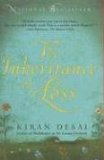Summary | Excerpt | Reading Guide | Reviews | Beyond the Book | Readalikes | Genres & Themes | Author Bio

One
All day, the
colors had been those of dusk, mist moving like a water creature
across the great flanks of mountains possessed of ocean shadows and
depths. Briefly visible above the vapor, Kanchenjunga was a far peak
whittled out of ice, gathering the last of the light, a plume of snow
blown high by the storms at its summit.
Sai, sitting on the veranda, was reading an article about giant squid in an old National Geographic. Every
now and then she looked up at Kanchenjunga, observed its wizard
phosphorescence with a shiver. The judge sat at the far corner with his
chessboard, playing against himself. Stuffed under his chair where she
felt safe was Mutt the dog, snoring gently in her sleep. A single bald
lightbulb dangled on a wire above. It was cold, but inside the house,
it was still colder, the dark, the freeze, contained by stone walls
several feet deep.
Here, at the back, inside the cavernous
kitchen, was the cook, trying to light the damp wood. He fingered the
kindling gingerly for fear of the community of scorpions living,
loving, reproducing in the pile. Once he’d found a mother, plump with
poison, fourteen babies on her back.
Eventually, the fire caught
and he placed his kettle on top, as battered, as encrusted as
something dug up by an archeological team, and waited for it to boil.
The walls were singed and sodden, garlic hung by muddy stems from the
charred beams, thickets of soot clumped batlike upon the ceiling. The
flame cast a mosaic of shiny orange across the cook’s face, and his top
half grew hot, but a mean gust tortured his arthritic knees.
Up
through the chimney and out, the smoke mingled with the mist that was
gathering speed, sweeping in thicker and thicker, obscuring things in
parts—half a hill, then the other half. The trees turned into
silhouettes, loomed forth, were submerged again. Gradually the vapor
replaced everything with itself, solid objects with shadow, and nothing
remained that did not seem molded from or inspired by it. Sai’s breath
flew from her nostrils in drifts, and the diagram of a giant squid
constructed from scraps of information, scientists’ dreams, sank
entirely into the murk.
She shut the magazine and walked out
into the garden. The forest was old and thick at the edge of the lawn;
the bamboo thickets rose thirty feet into the gloom; the trees were
moss-slung giants, bunioned and misshapen, tentacled with the roots of
orchids. The caress of the mist through her hair seemed human, and when
she held her fingers out, the vapor took them gently into its mouth.
She thought of Gyan, the mathematics tutor, who should have arrived an
hour ago with his algebra book.
But it was 4:30 already and she excused him with the thickening mist.
When
she looked back, the house was gone; when she climbed the steps back to
the veranda, the garden vanished. The judge had fallen asleep and
gravity acting upon the slack muscles, pulling on the line of his
mouth, dragging on his cheeks, showed Sai exactly what he would look
like if he were dead.
“Where is the tea?” he woke and demanded
of her. “He’s late,” said the judge, meaning the cook with the tea, not
Gyan. “I’ll get it,” she offered.
The gray had permeated inside,
as well, settling on the silverware, nosing the corners, turning the
mirror in the passageway to cloud. Sai, walking to the kitchen, caught
a glimpse of herself being smothered and reached forward to imprint her
lips upon the surface, a perfectly formed film star kiss. “Hello,” she
said, half to herself and half to someone else.
No human had
ever seen an adult giant squid alive, and though they had eyes as big
as apples to scope the dark of the ocean, theirs was a solitude so
profound they might never encounter another of their tribe. The
melancholy of this situation washed over Sai.
Copyright © 2006 by Kiran Desai. Reprinted with permission from Grove Atlantic, Inc. All rights reserved.




The secret of freedom lies in educating people, whereas the secret of tyranny is in keeping them ignorant
Click Here to find out who said this, as well as discovering other famous literary quotes!
Your guide toexceptional books
BookBrowse seeks out and recommends the best in contemporary fiction and nonfiction—books that not only engage and entertain but also deepen our understanding of ourselves and the world around us.